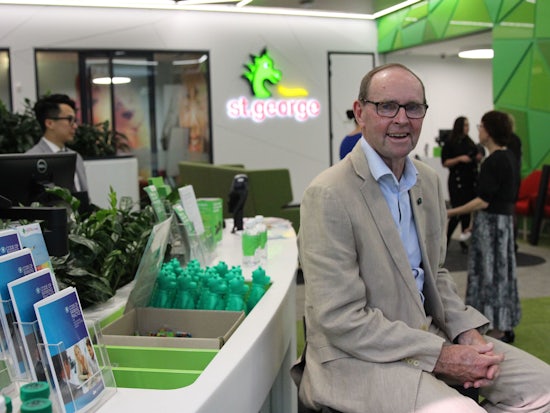Australia’s first dementia friendly bank announced
World Alzheimer’s Day (21 September) has been acknowledged in Australia with the welcome announcement of the nation’s first official Dementia Friendly Bank.

Trevor Crosby, who lives with Dementia, at St George as they announce Australia’s first Dementia Friendly Bank on World Alzheimer’s Day (Source: St George Bank)
The announcement comes following a partnership between St. George Bank and Alzheimer’s Australia with the aim of helping those living with dementia to remain financially independent for as long as possible.
Alzheimer’s Australia National Chief Executive Officer Maree McCabe says dementia currently affects more than 413,000 Australians, with that number set to grow.
She adds that given the results of a survey conducted by Alzheimer’s Australia as part of Dementia Awareness Month, that show 94 percent of respondents living with dementia have encountered embarrassing situations and that 96 percent feel less competent than before they were diagnosed, a dementia friendly bank is much needed.
“While there is no cure on the horizon, there are a number of strategies that can be put in place to minimise the impact, for the person with dementia, their carers, family and the community,” Ms McCabe says.
“Financial services are one of those extremely important areas where we need more awareness and understanding, which is why we are very pleased St. George Bank has come on board to be officially dementia friendly.”
Becoming a Dementia Friendly Bank has seen Alzheimer’s Australia provide all frontline bankers and call centre staff training to ensure they have both the education and skills required to identify and support a person living with dementia.
As part of the transition to being dementia friendly, St. George has also made changes to allow:
· Front line staff officially accredited to be able to recognise, respond and assist customers living with dementia
· Branches being audited by Alzheimer’s Australia to ensure a safer environment
· Branch technology upgraded to identify, record and maintain the files of a customer who has been nominated as having a vulnerability
· Referral of vulnerable customers onto Alzheimer’s Australia for further assistance if required
St. George has more than 900,000 customers over the age of 50, and of this population approximately 13 percent (123,000) may have some form of dementia, a “staggering” number that General Manager for St. George Retail Bank Ross Miller says can’t be ignored.
“As a family bank, we have a duty of care to support this growing number of Australians who are affected by dementia, including our customers, their carers and the community,” he says.
“Our pilot program earlier in the year revealed how stress and anxiety can be diminished for dementia sufferers, simply by making everyday banking as easy as possible.
“Our training program, developed in conjunction with Alzheimer’s Australia, has been instrumental in helping our bankers walk in the shoes of a person living with dementia, with many commenting how they didn’t realise the simplest things could be so hard.
“Providing an increased level of care is the right thing to do for our customers and we believe fostering a dementia friendly environment will help keep vulnerable customers financially independent for longer and less prone to financial abuse.”
The Dementia Friendly Banking plan will also be rolled out to Westpac, BankSA and Bank of Melbourne, with technology upgrades in-branch playing a huge role in support with bankers able to activate ‘customer vulnerability alert’ on a customer’s profile when they are notified of a customer’s condition.
“Our bankers will then know to provide the extra level of care required and set up a dementia friendly banking plan,” Mr Miller says.
“This includes options such as setting up withdrawal notification alerts, withdrawal limits on accounts, direct debits as well as alternative accounts and contacts.
“It also includes establishing important safe-guards like recognising when to start or update a will, or appoint an enduring power of attorney, all while the customer is still able to make these important decisions.”
As part of the Dementia Friendly Banking program, Alzheimer’s Australia will audit St. George branches, with the addition of the application of a dementia friendly lens in terms of layout, lighting, signage and quiet areas.























